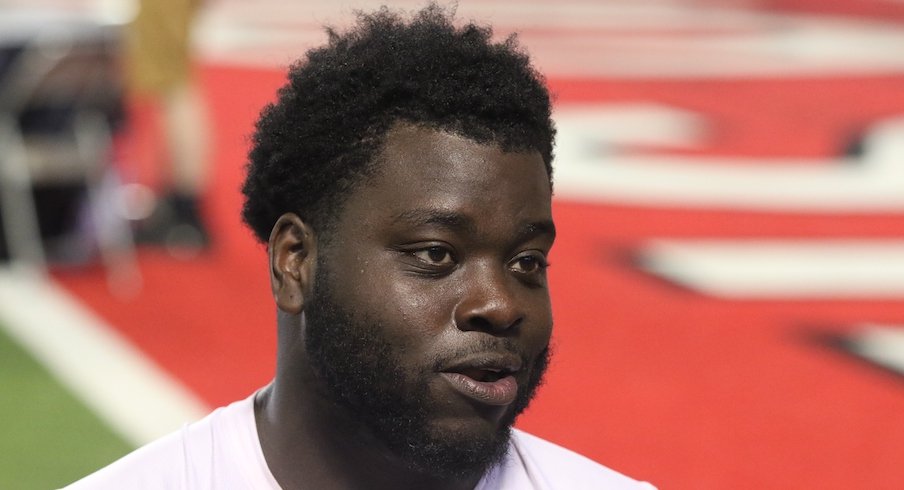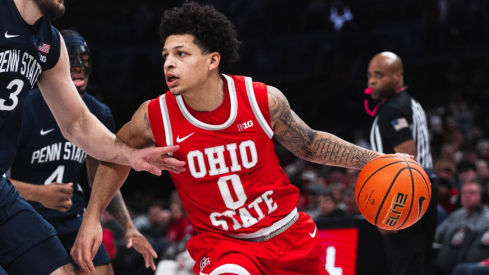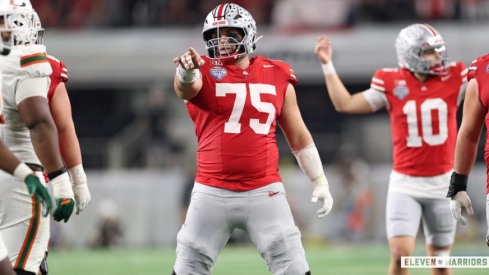Robert Landers set his phone to silent, as he often does after a long day, when he went to bed on Saturday night.
Landers and his Ohio State football teammates were coming off their second day of preseason camp, with their third August practice set for Sunday morning, and he wanted to make sure he got a good night’s sleep. But he still asked his brother Trey, who was going out in their hometown of Dayton that night, to let him know when he got home.
Landers woke up to a bevy of missed calls and text messages.
Trey Landers, who plays basketball at the University of Dayton, and three of his cousins were inside Ned Peppers, a bar in Dayton’s Oregon District, when a gunman began shooting outside the bar at around 1 a.m. Sunday morning. Trey and his cousins were unharmed, but nine people were killed and 27 others were injured in the massacre, which ended when the gunman was shot dead by police.
While Robert Landers was relieved to be able to call his brother and talk to him on Sunday morning, learning about the violence that had taken place in his hometown still weighed heavy on his heart.
“It was surreal because it’s like one of those things where for me, you see it on TV, you hear about it, things like that. You might see it sometimes in like some documentary movies, because I’m a big documentary person. But when it’s in your face, and it’s head-on, it’s a little different,” Landers said while meeting with the media at Ohio State on Thursday.
Glad I made it home safe last night and everybody else who did ... call and check on someone to make sure they cool ... God was definitely with me and @Two_Naames last night
— Trey Landers (@tlanders_03) August 4, 2019
Landers knows all too well about the deadly consequences of gun violence. In December 2006, when Landers was just 10 years old, his own father was shot and killed in Dayton. So Landers has a firsthand understanding of how the family and friends of those who were killed in Sunday’s shooting, and other recent acts of violence across the nation, might be feeling.
That’s why Landers took to Twitter on Tuesday to share a personal message about his experiences with battling mental health issues and to encourage other people to take care of themselves.
“You got so many people in the world today struggling with this disease called mental health that a lot of people don't want to talk about, and it's a real thing,” Landers said in his video. “It really does affect people in a negative way, and a lot of people don't know how to handle it. I can say me personally, I'm one of those people who have suffered from mental health on many occasions, and God has continued to bless me and put me in certain positions, but it's still an uphill battle on a day-to-day basis.
“We all got to just walk strong, walk with our heads up high and for me, the best way that I've learned to deal with this issue and this disease is by surrounding myself with the best possible people that I can surround myself by. Good, quality people. People who that no matter what's going on in my life, no matter what's going on in their life, if I need them, they'll be there.”
Walk with your head high and your heart strong... Take it one day at time, one step at a time, one second at a time... #937Strong #MentalHealth pic.twitter.com/hAvVIYhkun
— Robert Landers (@roblanders96) August 6, 2019
While meeting with the media on Thursday, Landers explained that his struggles with his mental health began after his father was killed. At just 10 years old, Landers suddenly became the man of the house, and he felt pressure to set an example for his two younger brothers.
Landers didn’t want to show any signs of weakness to his brothers who looked up to him, so he kept his personal battles to himself. Internally, though, Landers was struggling with the loss of his father and the new responsibilities he took on as a result.
“I was a boy who had to be a man, but I didn’t really know what being a man was,” Landers said. “My thing was like, ‘You know what, one thing I cannot do is be soft. I got to be a leader, I got to be a role model, I got to do this, I got to do this.’ And it was one of those things where I tried to keep myself busy not to think about it. And it took me all the way until getting to college for me to really understand what it was that I was dealing with.”
Now, Landers has learned how to cope with his emotions if he’s feeling stressed or down. He’s become comfortable opening up to Ohio State defensive line coach Larry Johnson and other members of the Buckeyes’ staff, including Ryan Day, who launched a mental health awareness fund through Nationwide Children’s Hospital this summer and has made it clear since becoming Ohio State’s head coach that he wants his players to feel comfortable talking to him about anything.
Landers said Day frequently makes sure he is doing well, and that means a lot to the Buckeyes’ fifth-year senior nose tackle.
“It just shows me how much he cares,” Landers said. “He’s consistently asking me, ‘Are you OK? Do you need anything? Do you want to talk about it? Do you want to talk to anybody?’ He’s actually concerned. And that’s one thing with Coach Day is he is a players’ coach. He cares about our well-being, he cares about our day-to-day mental state as well as our physical state, so I appreciate him.”
Day has said that his goal is to break the stigmas that surround mental health, especially among young men, and Landers wants to do the same. While Landers once bought into the stereotype that it was weak to show emotion, he’s since realized that’s not the case, and he hopes that other people who might be struggling with their mental health will seek help if they need it.
“It took me growing up and maturing and getting out of my ignorant state of understanding exactly what mental health is and how much of an issue that it is for me to realize that it’s not about me being weak,” Landers said. “I need help. I’m struggling. You know what I mean? So that’s how I look at it.”
“it was one of those things where I tried to keep myself busy not to think about it. And it took me all the way until getting to college for me to really understand what it was that I was dealing with.”– Robert Landers on coping with his mental health struggles
Although life hasn’t been easy for Landers off the football field, he’s shined on the gridiron. He’s been a regular in Ohio State’s nose tackle rotation for the past three years, all the while emerging as one of the Buckeyes’ most colorful personalities. He was sidelined by injuries this spring but is back on the field and healthy for preseason camp, and he’s expected to be among the Buckeyes’ team leaders this fall.
With the potential to play in the NFL next year, Landers hopes that football will allow him to provide a better life for not only himself, but also for his family. More simply, though, football has served as an escape that has helped him cope with the troubles he has faced in other aspects of his life.
“When I come to practice, I actually enjoy practice. It helps me clear my head and not think about nothing else,” Landers said. “As soon as I cross that red line, it’s all football. It’s all this play, that play, this scheme, that scheme.
“When I run out that tunnel, it’s tunnel vision,” Landers added. “I don’t hear the crowd, don’t see the crowd. I see the field. It puts me in a tranquil place and a tranquil state of mind to where, I’m good. I could be dog tired after a game. Whatever issues I had before the game started, it’s to the point where my mental is good enough to where if I got to deal with it, I can deal with it.”
Landers encourages other people who might face their own challenges with mental health to find their own coping mechanisms that work for them.
“I’m not the type of person where I want to go to counseling. But if it was anybody else, I would recommend it to somebody else,” Landers said. “I know what helps me, and my situation and how I deal with it is going to be different from somebody else. Somebody else might be good with talking to somebody. Somebody else might be better with watching movies or taking pictures. It just all depends on what helps you deal with what you’re going through.”


